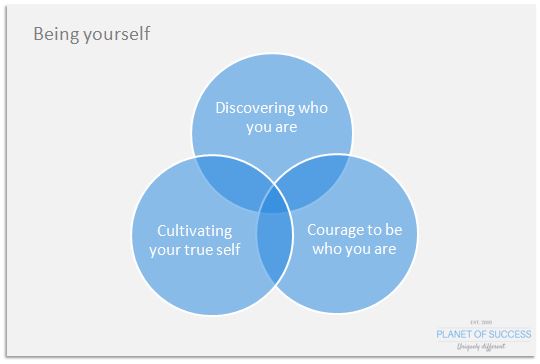“Just be yourself” might quite possibly be one of the most overused phrases when it comes to individual advice. Parents tell their children to be themselves when they go out on their first date. Friends encourage us to be ourselves when we have a job interview. There are many more situations in which people advise us that the best thing to do, is to simply be ourselves. But what does it mean, to be yourself? And more importantly, how can you be yourself when you don’t even properly know who you truly are? The following will shed light on this vague term and will show you what it really means to be yourself. Here’s a guide on how to be yourself! It’s easier than you think it is.
Before we start exploring what it means to be yourself, it might be beneficial to have a quick look at the exact opposite: not being yourself. While most people struggle to authentically be themselves, each and every one of us knows precisely when we’re not ourselves. We can even detect it when other people are simply not themselves. They are not authentic, genuine and simply come across as fake. In short, they are not acting with integrity and their behavior simply does not look right.

Propel your life by being your true authentic self.
What does it mean when you’re not yourself? When we’re not ourselves, we adapt our behavior based on the people we deal with. Meaning that we analyze the person we’re dealing with, their personality, attitude preferences and their general approach to life. Based on our analysis, we start adopting or changing our behavior, hoping that this person will perceive us differently. Basically, when you’re not yourself, you’re like an octopus who constantly changes colors depending on the environment. Not being yourself is a conformative approach to life that emphasizes other people’s opinion. It’s not your own opinion that matters, conformity and avoiding conflict is what matters when you’re not yourself.
There are obvious benefits to not being yourself. It helps you to fit in. It allows you to avoid tensions. Altering yourself might even make you a popular person everybody seems (!) to like. But deep inside yourself, you know that you’re not authentic; that you’re not your true self. And the vast majority of people can smell it when someone is not genuine.
“Be yourself; everyone else is already taken.”
Oscar Wilde
Instead of living life with several masks, I encourage you to be yourself. Which leads us back to the question what it actually means, to be yourself.
How to Be Yourself?
Basically, the whole process of learning to be yourself consists of three steps. Firstly, being yourself is all about discovering who you truly are. Secondly, being yourself requires the cultivation of your true self. Thirdly, to be truly yourself requires the development of the courage to be who you truly are. Here’s a quick overview of this process:

Overview of the key elements of being yourself
Let’s have a look at this process in more detail.
Part 1: Discovering who you truly are
The vast majority of people define themselves based on their job, background, heritage and their possessions. But all of these things are external, outside of yourself. None of these things truly define who you are. They might shape and form you, but they’re not your essence. If you lose all your possessions, you’re still yourself. If you switch your job, you still remain the same person.
The only way to actually know how to be yourself, is to discover who you are. By developing an understanding about who you are at your core level, it’ll be easier for you to be yourself. But how can you discover your essence, that which defines you?
1. What are your core values?
Values, principles and attitudes shape your whole life. But how can you be yourself, if you have no idea what your core personal values are?
Basically, personal values define what you believe in and what is important to you. It’s an internal roadmap by means of which you determine what is good, supportive, beneficial and desirable or bad, unhelpful, unbeneficial and undesirable. Consequently, by understanding what your core values are, you can better set your priorities in life.
“It’s not hard to make decisions when you know what your values are.”
Roy Disney
Take yourself the necessary time to discover what you value. Find out what it is that makes up your essence. After some time you’ll not only develop a good understanding about your personal values, but you’ll also start acting accordingly. That’s one step closer towards being yourself and living with more authenticity.
2. What makes you feel alive?
We’re often not ourselves because we do things we’re not comfortable with. This may range from daily activities to the pursuit of a specific career path. The underlying issue of this lies often in the fact that we simply do not know what it is that makes us feel alive. As a result, we are drawn to activities that do not reflect our true interests. Just like a moth is drawn to the fire, we do things that we’re not in tune with or harm us internally. Consequently, it simply doesn’t feel right what we’re doing. We might even pursue activities that won’t ever allow us to truly be ourselves.
Try to discover what it is that makes you feel alive. Think about all the things that fulfill and satisfy you. Ponder about all the things that you absolutely love doing. By developing a good understanding about that which makes you feel alive, you will be able to better align your actions with your core self.
3. What would you do, if money did not exist?
All too often, our actions are dictated by the desire to earn money. Instead of choosing a profession that really fulfills us, we often choose the most lucrative option. Consequently, we tend to neglect that which truly gives us a sense of purpose. We are simply basing many of our decisions on financial aspects, not on happiness, fulfillment and growth. This often happens because people have a limited understanding of success and primarily equate success with the amount of money they have. Based on this narrowed down understanding of success, we limit our aspirations and dreams because they do not seem financially plausible.
Let’s introduce some refreshing change to this. Think about the things you would do, if money did not exist. Posing yourself this question will definitely get you thinking about your true purpose and passions.
4. What is your purpose?
A great number of people have difficulties pinpointing what their purpose in life is. And quite frankly, discovering your purpose can be quite difficult. It’s not something one finds within a couple of hours or days. Yet, it’s incredibly important to actively seek the purpose of your life. By giving your very best to discover what it is that gives your life a meaning, you are proactively making an important step towards being your true self. Because quite frankly, how could a person ever be themselves by continuously having to fulfill another person’s purpose? See also: Discover Your Purpose in Life.
“The purpose of life is not to be happy. It is to be useful, to be honorable, to be compassionate, to have it make some difference that you have lived and lived well.”
Ralph Waldo Emerson
Being yourself and finding a purpose in your life are closely interrelated. Some ancient philosophers even considered being true to yourself as your overall purpose in life, as it will automatically aid you in following your destiny.
5. Leaving room for growth
One essential mistake many people make when they seek to discover who they are is that they place too much emphasis on the past. Your past may define you, but it should never limit your progress. Discovering who you are is not about defining who you have been in the past. Also, it’s not about defining how you behaved in the past. It’s all about discovering your true essence and who you are at your deepest core level. Consequently, being yourself doesn’t mean that you have to spend the rest of your life the way you’ve always been. Even further, being your true self does not have to be fixated to a static ideal of yourself. It is something that can adapt, develop and grow throughout the course of many years.
Summary of part 1
Discovering who you are is all about finding and defining yourself based upon your own values and terms. It’s not about picking someone else’s ideas of life and implementing them in your own. Instead, it’s all about developing your own, unique approach to life. By discovering who you are, you align with your core essence, which acts as the foundation for an authentic life that is characterized by integrity. Just be sure not to consider the concept of living your true self to be something that is restricted. Instead, allow enough room for change and growth.
Part 2: Cultivating your true self
The second part is centered on the cultivation of the right attitude towards yourself. That’s an incredibly important point, which should not be neglected. After all, if you think negatively of yourself, being yourself will be all the more difficult. In fact, why should you be yourself, if you’re not comfortable with who you are? However, if you do not only accept who you are, but also appreciate yourself the way you are, it’ll be far easier for you to authentically be yourself.
1. Developing self-respect
There are two major disadvantages to treating yourself poorly. First, you will feel miserable. Second, you will invite other people to treat you equally bad. Why should other people respect you, if you don’t even treat yourself with respect in the first place?
Treat yourself with the same respect and dignity you treat your family and friends. Find out what it is that makes you feel not so good about yourself and change it. If you don’t like a specific aspect of yourself, find possible solutions that help you to see yourself in a brighter light. This can be either done by changing what you do not like, or by changing your attitude towards it.
2. Cultivating self-love
If you think about an authentic person, you will realize that they are perfectly fine with who they are. Not only that, but you will also notice that they really love themselves and have no problems with their faults and shortcomings.
If you learn to truly love yourself within, it will encourage you to also be yourself in the outside world. Not only will it make you more confident, but it will also make others perceive you as a person of authenticity and integrity.
The cultivation of self-love can be encouraged by a variety of different steps. The first step would be to pay close attention to the way you perceive yourself and talk to yourself. Secondly, you should also place importance to the way you treat your body and what you eat. Thirdly, developing self-love also depends highly upon your own sense of purpose.
3. Forging your own path
One major reason why people are not comfortable with who they are (which also discourages them from being themselves) lies in the great emphasis we place on other people, especially celebrities. While it’s certainly good to have role models, desperately trying to be exactly like them is not. One can portray another person and even copy their behavior, but they will never reach the same level of authenticity.
“Always be a first-rate version of yourself and not a second-rate version of someone else.”
Judy Garland
Copying other people’s behavior might be a good strategy to fit in. But it does not help you to live with authenticity. And it certainly does not help with being yourself. Therefore, I encourage you to have the bravery to forge your own path. Have the courage to express your individuality and to develop your own approach to life.
4. Accepting mistakes, shortcomings and failures
Another important aspect that needs to be mentioned when it comes to treating yourself with dignity and respect is the topic of acceptance. Specifically, the acceptance of mistakes, shortcomings and failures. Instead of blaming yourself for mistakes, learn to forgive yourself and go on with your life. Accept the fact that you’re not perfect. Nobody is. But most people simply do not have the courage to accept their imperfectness. Plus, occasional failure might not be such a bad thing after all.
“Be who you are and say what you feel, because those who mind don’t matter, and those who matter don’t mind.”
Bernard M. Baruch
This is especially important when it comes to being yourself. There will be times when people will tease you for your imperfection, they might ridicule you and make fun of you. But ultimately, these people might not be worth your time and energy. And if they’re your friends, they will not only learn to accept who you are, but also respect you for the courage to be yourself.
Summary of part 2
The foundation of living with integrity and being yourself lies in your self-respect and self-love. By cultivating not only self-respect, but also love for yourself, you will develop the necessary confidence to be yourself.
Part 3: The courage to be yourself
1. Not caring about what others think of you
The number one problem that prevents us from truly being ourselves is our fear of other people’s opinion. We are afraid of the negative consequences that being oneself can come with. As a result, we rather prefer to be inauthentic and try to fit in, instead of allowing our uniqueness to unfold. Granted, being yourself may be difficult at times and not everybody may like who you really are. But being yourself is all about gaining independence from other people’s opinion. It is the development of the courage required to not care about other people’s thoughts. After all, you cannot change what other people think of you. Not even bending backwards will help you at that, so why even bother?
2. Not trying to please everyone
Another expression of putting too much emphasis on other people’s opinion lies in the attempt of trying to please everyone. Usually, we have a tendency to seek other people’s approval and respect. With this also comes the desire to be loved by everyone. Consequently, we adapt our behavior in such a way so that we can please the greatest number of people possible. The problem with this lies in the obvious fact that we simply cannot please everyone. It simply isn’t possible, but it will cause us to waste important time and energy in trying to accomplish the impossible.
Instead of trying to shy away from conflict, be yourself and have the courage to meet the decision that is best for you, not others. You can try to please other people as much as you want, but there is no happiness or fulfillment to be found in other people’s approval.
3. Not comparing yourself to others
If you’re striving to be someone else, you’ll never be yourself. You might be a tolerable copy of another person, but you never be authentically yourself. And even though it’s the most natural thing to compare yourself with other people, it might be quite unbeneficial. That’s because comparisons are not always just. We tend to compare our worst aspects with those who typically excel in these areas. Comparisons also create resentment, waste time and deprive joy.
“When you are content to be simply yourself and don’t compare or compete, everyone will respect you.”
Lao Tzu
Having the courage to be yourself means that you do not seek to compete with others. It means that you excel in your very own areas of interest.
4. Following your intuition
Once you let go of all the obligations and dependencies of other people and their opinion, you’ll notice that your behavior becomes much more intuitive. One could even say that ignoring your intuition might almost always result in behaving differently than who you really are.
Have the courage to consider the intuitive hints that you get from time to time. They will help you to be more of yourself and to act with more integrity/authenticity. Even if that means that you no longer behave the way other people want you to.
Summary of part 3
Placing less importance to other people’s opinion will help you to lead a more authentic life that is in tune with who you are. This process can be further accelerated by stopping to continuously compare yourself with others and trying to please everyone.
The “being yourself” cheat sheet
- Don’t try to please others.
- Don’t worry what others think of you.
- Share your opinion.
- Appreciate who you are.
- Don’t seek other people’s approval.
- Get to know yourself.
- Follow your intuition.
- Communicate open and freely.
- Forge your path.
- Cultivate your true self.
- Accept who you are.
- Accept mistakes, shortcomings and failures.
- Develop self-respect.
- Love yourself.
The benefits of being yourself
- You’ll be more tune with yourself
- Others will respect you for standing up for what you believe in
- You’ll be more relaxed
- Other people’s behavior will influence you less
- You’ll be less tensioned
- You’ll be more authentic
- Others will value your integrity
- You spend less time worrying about other people’s opinion
- You spend less time trying to manipulate others
- You waste less time trying to please others
- You’ll be less dependent upon other people
The (negligible) risks of being yourself
Having the courage to be yourself naturally comes with risks. You might be confronted with people who do not share your opinion. Who do not appreciate what you stand for and who you truly are. People who want to change you, who want you to live life according to their plans. They might attack you and blame you. But they will never ever consider you a person who doesn’t stand up for what you believe in. And that’s something most people do not only appreciate, it’s something that they deeply look up to.
Another risk involved with being yourself is that other people might know longer be able to influence your decisions. While this certainly introduces independency in most people’s lives, there will no longer be someone else to blame, if things don’t work out.
If these are the only risks, then why wait any longer? Have the courage to be yourself, right here and right now.
“To be yourself in a world that is constantly trying to make you something else is the greatest accomplishment.”
Ralph Waldo Emerson
I hope you enjoyed this article about the exploration on how to be yourself. Do you sometimes struggle to wholeheartedly be yourself around others?
Stay victorious!




3 Comments
Great article… thank you so much …God bless you
You’re welcome! I am happy the article helped you.
Hi Steve ,
I enjoy reading almost all your posts , in fact very practical points , enlightening and relate to mundane, matter of fact situations. Deeply appreciate your good work. Stay blessed.